How to take care of your matcha whisk (5 simples steps)
I brew matcha anywhere between 2 to 3 times a day.
My wife loves it too! So our matcha addiction means that my trusty matcha whisk (called a Chasen in Japan) gets a really good workout.
More than I do these days!
So how does a handmade matcha whisk hold up to the test of time?
Very well actually...so long as you take good care of it.
Here are 5 simple tips that I use to keep my whisk in tip top shape.
Tip 1 - Soak the Matcha whisk in hot water before putting it to work.
The tines of a bamboo matcha whisk a very brittle and susceptible to breaking off.
This can happen prematurely if you don't season the whisk before use.
Placing the whisk in a bowl of hot water for at least 30 seconds before each use will allow the tines to absorb the water which will in turn soften the tines and prevent breakage.
What I tend to do is - pour boiling water into my chawan (warms the bowl nicely before brewing) then place the whisk in the chawan for 30 seconds.
Once 30 seconds is up, take the whisk out and pour the water down the sink.
Your Whisk is now seasoned and ready to dance the Zig Zag.
Special mention: If your whisk is brand new, the tines will be very stiff at first. It will take at least 3-5 brews before the whisk starts to bloom and the tips to soften up. Once the whisk has softened up, making the Matcha froth will be much easier.
Tip 2 - Work on your whisking technique
The easiest way to ruin your precious whisk is improper use.
The number 1 rule is to try not let the tines of the whisk scrub against the bottom of the bowl.
This might be difficult to prevent if you are whisking matcha in a coffee mug.
An original chawan matcha bowl is designed with practicality in mind, which is why they feature a wide open mouth and good size bowl base.
A matcha bowl is far more shallow than a mug and will give you the space you need to perfect the whisking technique.
Tip 3 - Rinse the whisk with water immediately after use
Your bamboo Matcha whisk can easily attract mould if not cleaned and dried after each use.
Don't wait to wash. Wash immediately after use.
Don't put your whisk in the dishwasher for cleaning.
Don't use detergent to clean your whisk either.
Instead, simply run warm water over the whisk with the tines facing down. I say this, because as much as possible, you don't want water pooling up in the narrow neck of the whisk.
I use a bamboo brush and gently wipe the tines down removing any excess matcha under the tap.
Tip 4 - Air dry your bamboo whisk
Mould is a whisks worst enemy!
Bamboo is porous so if your matcha whisk is stored away before it has completely dried then I'm afraid your whisk will start to turn a bit smelly.
The fastest way to dry your matcha whisk is to keep the tips down and place your whisk on a window sill to catch some sunlight or somewhere open air and dry.
Don't place it in the cupboard draw or pantry until it is completely dry.
Use a drying rack or better still, invest in a ceramic purpose built whisk holder.
The whisk holder will help maintain the natural shape of the whisk and at the same time do a great job in speeding up the drying process.
Tip 5 - Store your whisk in a cool dry place
Do not store your whisk in the plastic cylinder packaging that it came in.
That is a breeding ground for mould.
Instead, once it has completely dried out, then your best bet is to store it in a cool dry place.
When is it time to get a new whisk?
After the very first use, the shape of the matcha whisk will change.
The whisk will start to bloom and the tines in the centre will generally loosen and open up.
This is perfectly normal. In fact, the more the whisk opens up, the easier it gets to produce frothy matcha.
Over time, the tines will eventually break off. Even with a few tines broken you will find that the whisk will still perform well.
If you do see signs of mould, or it starts to smell funny - then try boiling it in water for some minutes and brush it down.
You can even use a hair dryer to rapidly dry the whisk and prevent moisture building up.
In my experience, if you follow these tips you can get at least 12 - 18 months out of your whisk.
If it is however, time to replace your matcha whisk, then we have a variety of styles available to suit all budgets and requirements.
For the absolute Matcha connoisseur - we also sell genuine Japanese made whisks from Takayama.
The SHIN Chasen is the same whisk used at the highly esteemed Urasenke school of traditional Japanese tea.
I find that the tines of a Japanese bamboo whisk are finer and have more flex and spring.
This is an excellent feature of a Japanese made whisk because it means that you can produce foamy matcha almost effortlessly!
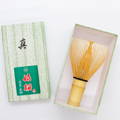
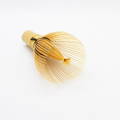
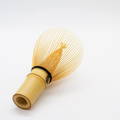
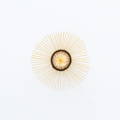
The UNGE Chasen is another clever Japanese made whisk and crafted into by the hands of Kizo Nakata in Takayama Japan.
This bamboo whisk has a unique innovative design as it is made with three rows of prongs, rather than the usual two.
The major benefit of this clever design is that it is easier and faster to aerate the matcha and produce that nice layer of creamy foam.
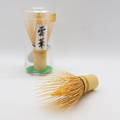
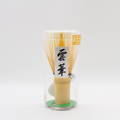
Buy a Takayama Japanese Made Whisk
Buy a Good Quality Chinese Made Whisk
Most of the matcha whisks sold today are manufactured in China. The Chinese whisks are very good for the price that you pay.
We stock 2 styles of Chinese whisks. The plain bamboo whisk and also a purple bamboo whisk.





